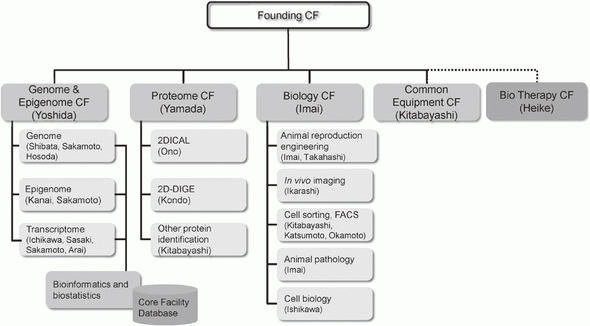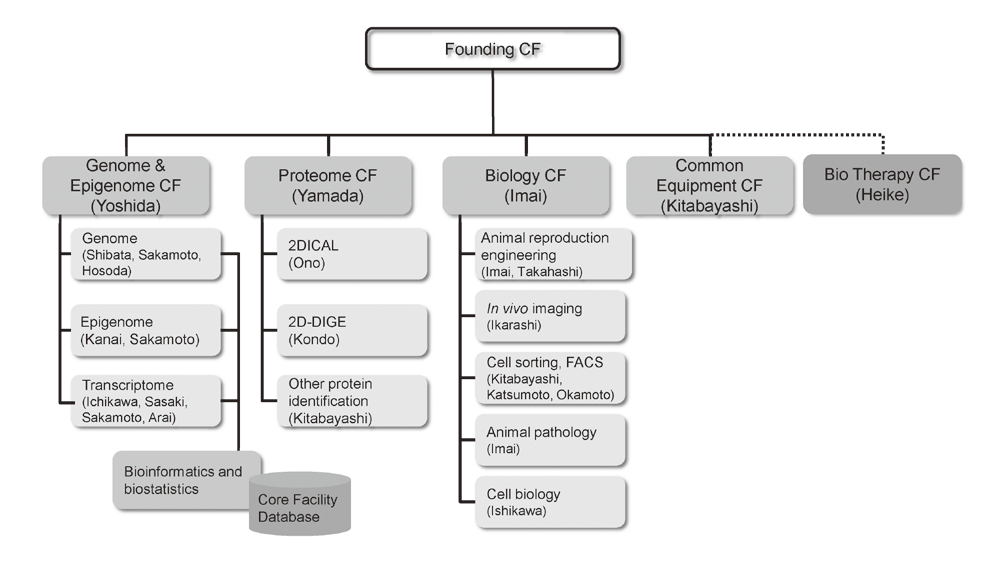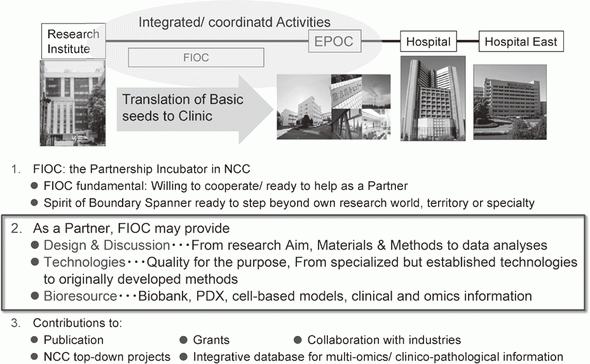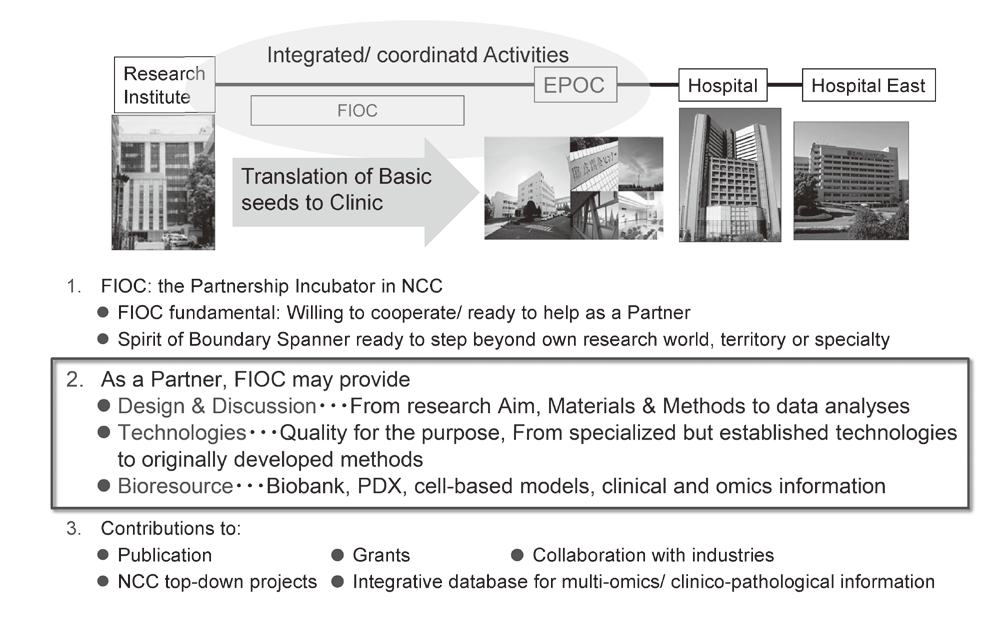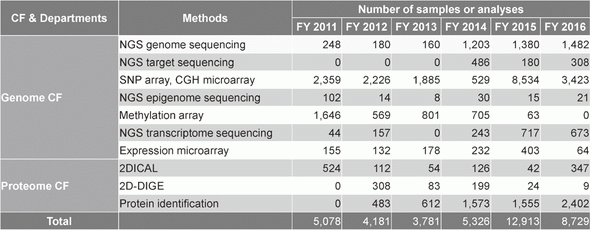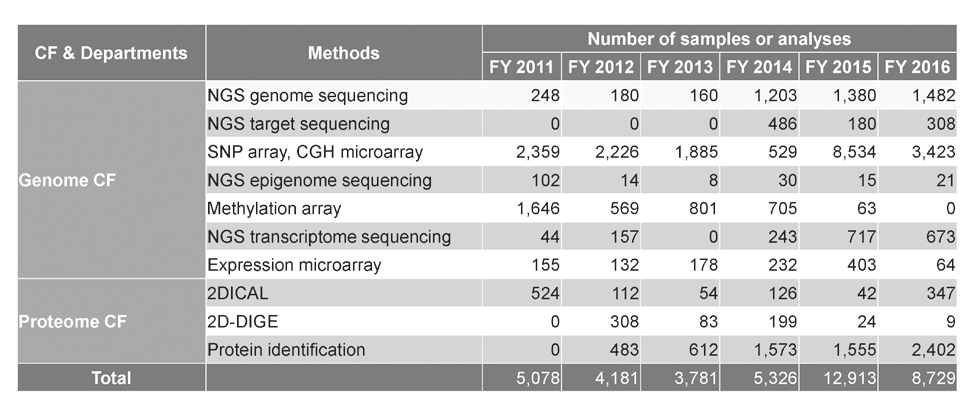HOME > Publication & Reports > Annual Report 2016 > Research Institute
Research Support Division
Teruhiko Yoshida
Introduction
According to the organization regulation of the National Cancer Center (NCC), the mission of the Research Support Division is the promotion of high quality research in the NCC Research Institute (NCCRI) and other sections in the NCC by providing basic experimental technical support. In short, our division aims to provide research core facility (CF) service.
Our team and what we do
Although the Research Support Division has only one official staff, it has a number of collaborating researchers and technical staff from various divisions and departments to join the CF initiative. Our division essentially serves as a core or headquarter of CF, which is a virtual organization based on the mutual support among research scientists and laboratories, each engaging in their own competitive research.
The concept of CF in the NCCRI has originated from the 1st lecture given by Dr. Hitoshi Nakagama on May 9, 2011 after his appointment as the Director of the NCCRI. Along with the Biobank, the CF has been positioned between the NCCRI and the NCC Hospital to establish a bidirectional translational bridge. The combination of the rich collection of high quality clinical samples and advanced reliable analytical power should be a core asset of the NCCRI. However, the latest genome and other omics technologies demand heavy and stable investments in hardware and human expertise, including those in the field of bioinformatics, which are increasingly difficult to afford by individual laboratories, such as those led by young principal investigators (PIs) and physician scientists. As a consequence, the CF has become an essential component integrated in many leading biomedical research institutes throughout the world.
Research activities
Figure 1 shows the original CF framework officially started on September 5, 2011 with four major arms: Genome & Epigenome, Proteome, Biology, and Common Equipment CFs.
In August 2014, the Fundamental Innovative Oncology Core Center (FIOC) was established as a new subgroup of the laboratories in the NCCRI, and Dr. Atsushi Ochiai, the Deputy Director of the NCCRI, was appointed as the Founding Director of the FIOC. The initial mission of the FIOC emphasized its promoting role in Translational Research (TR) in the NCC as shown in Figure 2. The CF system in Figure 1 as well as the Biobank Service Unit in the NCC Tsukiji campus was incorporated into the FIOC. In 2016, the Chief of the Research Support Division was assigned as the FIOC Director to take over the managing role.
Because the CF covers such diverse activities, its performance is difficult to quantify, but just as a simplified example, the numbers of the individual research projects and samples submitted to the CF are summarized in Figure 3.
Clinical trials
Our division did not directly take part in the clinical intervention trials, although the FIOC may support molecular correlative studies of clinical trials.
Education
As emphasized in Figure 2, one of the most important contributions of the CF may be the discussion and consultation BEFORE offering the actual service.
Future prospects
The CF should keep exploring the latest needs among the NCC researchers and revising its service menu accordingly. It is also crucial to evaluate the effort of the CF staff in an appropriate way and develop sound and effective incentive for an active commitment to the CF service. At least a part of the CF financial fundamentals needs to be supported by the NCC in-house budget, such as machine maintenance, fundamental bioinformatics contract service, and core human resource cost.
In the spring of 2017, the NCCRI will be moved to the new building, in which the FIOC will be given a single floor and will be more visible as a solid real subgroup of departments and divisions of the NCCRI. The major revision of the FIOC organization will be installed, including the discontinuation of the Research Support Division. The renovated FIOC will be expected to play a more powerful role in leading TR, including those in collaboration with the industrial sector.

